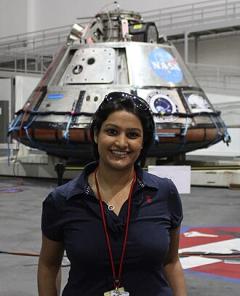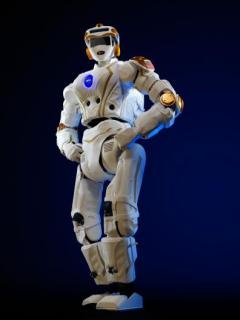Dr Varsha Jain raises awareness of Space Gynaecology
Dr Varsha Jain is a Wellbeing of Women Clinical Research Fellow at the Centre for Reproductive Health (within IRR) at the University of Edinburgh, investigating why women suffer from heavy menstrual bleeding.
She is a practicing clinician specialising in obstetrics and gynaecology and also has an accomplished science portfolio, including her work as a “space gynaecologist”. Varsha was always fascinated by the impact space has on human health and was one of the first academic doctors to focus on researching women's health in relation to space.

Dr Jain is eager to communicate the importance of conducting research on women's health in space as she feels it will benefit women's health on earth. She has experience in clinical trials and laboratory based research in the UK, as well as space medicine research with NASA Johnson Space Center, USA and the European Space Agency.
Varsha has used her experience in large data set analysis to establish an academic approach to women's health in space and explore the idea of personalised health for astronauts. Her current research project, funded by Wellbeing of Women, involves analysing samples of endometrium from women with both fibroids and adenomyosis to understand what is really happening when women have abnormal uterine bleeding.
She has received extensive public and press attention about her work. Recently, Dr Jain was interviewed by BBC Science Focus about the logistics of having babies in space and discusses space gynaecology and research more generally.
If humans are going to live in space, how will we reproduce? What happens to women’s bodies in space and are ‘space babies’ even possible? Have a listen: Will we be able to have babies in space? - Instant Genius | Podcast on Spotify
This Wellbeing of Women webinar video offers a comprehensive background to Varsha’s research into menstruation and educates the public on heavy menstrual bleeding (HMB). She joined a group of experts to talk about what HMB is, if it is common, and the impact it can have: https://www.youtube.com/watch?v=Yz1LYVk848Y
You can watch Varsha’s New Scientist video about her fascinating research into female astronauts and their menstrual and mental health and how her findings translate to help women with problematic periods here on earth.
Why not also listen to her input to this fascinating episode of The Vagina Museum podcast discussing all things periods, menstrual health, heavy menstrual bleeding and space gynaecology. This platform boasts 186k followers on Twitter, so appearing on this woman’s health focused podcast offered a brilliant awareness raising opportunity: https://play.libsyn.com/embed/episode/id/25371462/height/192/theme/modern/size/large/thumbnail/yes/custom-color/ffffff/time-start/00:00:00/playlist-height/200/direction/backward/download/yes
Dr Jain's interest in the health of women in space is fairly unusual for a doctor working in academia. She has been consulted on her knowledge of how women astronauts deal with toilets, menstruation and the risk to the eggs that they carry. Moving forward, it is likely that there are going to be more female astronauts, as NASA and the European Space Agency (ESA) increase their recruitment of female candidates.
Varsha has worked with a team of experts for ESA to create the first research agenda for reproductive health by any space agency. Read more here: https://esamultimedia.esa.int/docs/HRE/12_HumanResearch_HumanPhysiology.pdf
Dr Jain was recently invited to a University of Edinburgh luncheon in honour of astronaut Dr Kathleen (Kate) Rubins, who was attending the UoE to support an ongoing relationship the University has with NASA. Varsha’s attendance was requested due to her ongoing experience working on female astronaut health with both NASA and the European Space Agency.

Dr Rubins visited the National Robotarium and the Royal Observatory, followed by a panel session discussing “The Future of Space Exploration”.
The University of Edinburgh is a space University (only Oxford, Cambridge and UCL publish more space research than UoE) and has the fastest University-based supercomputer in Europe. The UoE also hosts a Valkyrie humanoid robot on campus; the first outside of North America (Valkyrie is one of the most advanced humanoid robots created by NASA).
Dr Jain was delighted to discuss the importance of building healthcare collaborations and developing parallels with spaceflight for reproductive health research.

